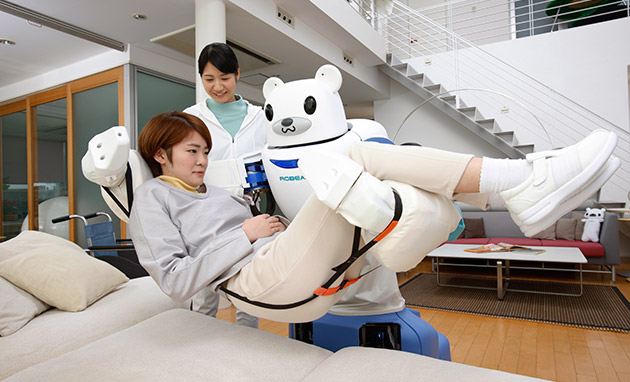Robear robot care bear designed to serve Japan’s aging population
Japan has long been looking at how it might use robots to provide care for the elderly, and with a rapidly aging population, and a birth rate that continues to fall, the issue has taken on growing importance in recent years.
Scientists from RIKEN and Sumitomo Riko Company Limited have found the solution for Japan’s elderly population by developing a new experimental nursing care robot, ROBEAR, which is capable of performing tasks such as lifting a patient from a bed into a wheelchair or providing assistance to a patient who is able to stand up but requires help to do so. ROBEAR will provide impetus for research on the creation of robots that can supplement Japan’s need for new approaches to care-giving.
Robear is based on Riken’s Robot for Interactive Body Assistance (RIBA) and RIBA II assistance robots that were unveiled in 2009 and 2011, respectively. It was developed by the RIKEN-SRK Collaboration Center for Human-Interactive Robot Research in Nagoya, and is designed to be strong, yet gentle, with a teddy-bear head and a soft design that is intended to be as un-Transformer-like as possible.

Robots not only promise to make up for the shortage of carers, but to save human personnel from having to carry out strenuous tasks, such as lifting patients out of bed 40 times a day. To this end, like RIBA-II, Robobear can lift a patient out of bed and into a wheelchair, help patients to stand, and to turn them to prevent bed sores, but it weighs only 140 kg (308 lb) to RIBA-II’s 230 kg (507 lb). Paradoxically, it also has a smaller base than the previous model, yet is more stable. This is due to a set of deployable legs that it can use to steady itself as needed, yet tuck away when moving.
According to RIKEN, Robear has improved, very low gear ratio actuators that make its joints fast and responsive. They also have backdrivability – a feedback mechanism that makes for softer movements. In addition, there are torque sensors and Smart Rubber capacitance-type tactile sensors for gentle movements that allows Robear to lift and assist patients safely and comfortably.
“We really hope that this robot will lead to advances in nursing care, relieving the burden on caregivers today,” says Toshiharu Mukai, leader of the Robot Sensor Systems Research Team. “We intend to continue with research toward more practical robots capable of providing powerful yet gentle care to elderly people.”

